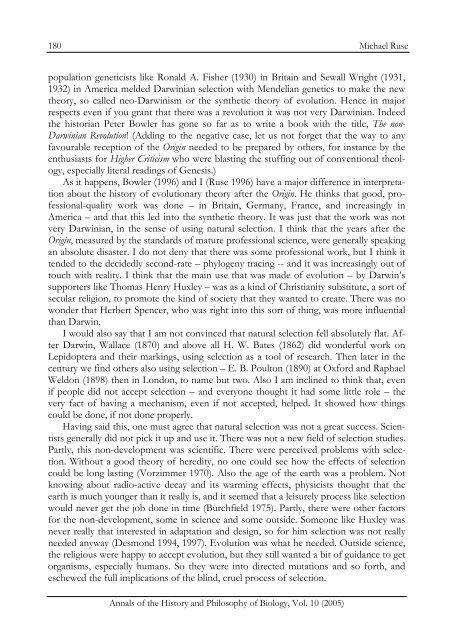Annals of the History and Philosophy of Biology
Annals of the History and Philosophy of Biology
Annals of the History and Philosophy of Biology
You also want an ePaper? Increase the reach of your titles
YUMPU automatically turns print PDFs into web optimized ePapers that Google loves.
180<br />
<strong>Annals</strong> <strong>of</strong> <strong>the</strong> <strong>History</strong> <strong>and</strong> <strong>Philosophy</strong> <strong>of</strong> <strong>Biology</strong>, Vol. 10 (2005)<br />
Michael Ruse<br />
population geneticists like Ronald A. Fisher (1930) in Britain <strong>and</strong> Sewall Wright (1931,<br />
1932) in America melded Darwinian selection with Mendelian genetics to make <strong>the</strong> new<br />
<strong>the</strong>ory, so called neo-Darwinism or <strong>the</strong> syn<strong>the</strong>tic <strong>the</strong>ory <strong>of</strong> evolution. Hence in major<br />
respects even if you grant that <strong>the</strong>re was a revolution it was not very Darwinian. Indeed<br />
<strong>the</strong> historian Peter Bowler has gone so far as to write a book with <strong>the</strong> title, The non-<br />
Darwinian Revolution! (Adding to <strong>the</strong> negative case, let us not forget that <strong>the</strong> way to any<br />
favourable reception <strong>of</strong> <strong>the</strong> Origin needed to be prepared by o<strong>the</strong>rs, for instance by <strong>the</strong><br />
enthusiasts for Higher Criticism who were blasting <strong>the</strong> stuffing out <strong>of</strong> conventional <strong>the</strong>ology,<br />
especially literal readings <strong>of</strong> Genesis.)<br />
As it happens, Bowler (1996) <strong>and</strong> I (Ruse 1996) have a major difference in interpretation<br />
about <strong>the</strong> history <strong>of</strong> evolutionary <strong>the</strong>ory after <strong>the</strong> Origin. He thinks that good, pr<strong>of</strong>essional-quality<br />
work was done – in Britain, Germany, France, <strong>and</strong> increasingly in<br />
America – <strong>and</strong> that this led into <strong>the</strong> syn<strong>the</strong>tic <strong>the</strong>ory. It was just that <strong>the</strong> work was not<br />
very Darwinian, in <strong>the</strong> sense <strong>of</strong> using natural selection. I think that <strong>the</strong> years after <strong>the</strong><br />
Origin, measured by <strong>the</strong> st<strong>and</strong>ards <strong>of</strong> mature pr<strong>of</strong>essional science, were generally speaking<br />
an absolute disaster. I do not deny that <strong>the</strong>re was some pr<strong>of</strong>essional work, but I think it<br />
tended to <strong>the</strong> decidedly second-rate – phylogeny tracing -- <strong>and</strong> it was increasingly out <strong>of</strong><br />
touch with reality. I think that <strong>the</strong> main use that was made <strong>of</strong> evolution – by Darwin’s<br />
supporters like Thomas Henry Huxley – was as a kind <strong>of</strong> Christianity substitute, a sort <strong>of</strong><br />
secular religion, to promote <strong>the</strong> kind <strong>of</strong> society that <strong>the</strong>y wanted to create. There was no<br />
wonder that Herbert Spencer, who was right into this sort <strong>of</strong> thing, was more influential<br />
than Darwin.<br />
I would also say that I am not convinced that natural selection fell absolutely flat. After<br />
Darwin, Wallace (1870) <strong>and</strong> above all H. W. Bates (1862) did wonderful work on<br />
Lepidoptera <strong>and</strong> <strong>the</strong>ir markings, using selection as a tool <strong>of</strong> research. Then later in <strong>the</strong><br />
century we find o<strong>the</strong>rs also using selection – E. B. Poulton (1890) at Oxford <strong>and</strong> Raphael<br />
Weldon (1898) <strong>the</strong>n in London, to name but two. Also I am inclined to think that, even<br />
if people did not accept selection – <strong>and</strong> everyone thought it had some little role – <strong>the</strong><br />
very fact <strong>of</strong> having a mechanism, even if not accepted, helped. It showed how things<br />
could be done, if not done properly.<br />
Having said this, one must agree that natural selection was not a great success. Scientists<br />
generally did not pick it up <strong>and</strong> use it. There was not a new field <strong>of</strong> selection studies.<br />
Partly, this non-development was scientific. There were perceived problems with selection.<br />
Without a good <strong>the</strong>ory <strong>of</strong> heredity, no one could see how <strong>the</strong> effects <strong>of</strong> selection<br />
could be long lasting (Vorzimmer 1970). Also <strong>the</strong> age <strong>of</strong> <strong>the</strong> earth was a problem. Not<br />
knowing about radio-active decay <strong>and</strong> its warming effects, physicists thought that <strong>the</strong><br />
earth is much younger than it really is, <strong>and</strong> it seemed that a leisurely process like selection<br />
would never get <strong>the</strong> job done in time (Burchfield 1975). Partly, <strong>the</strong>re were o<strong>the</strong>r factors<br />
for <strong>the</strong> non-development, some in science <strong>and</strong> some outside. Someone like Huxley was<br />
never really that interested in adaptation <strong>and</strong> design, so for him selection was not really<br />
needed anyway (Desmond 1994, 1997). Evolution was what he needed. Outside science,<br />
<strong>the</strong> religious were happy to accept evolution, but <strong>the</strong>y still wanted a bit <strong>of</strong> guidance to get<br />
organisms, especially humans. So <strong>the</strong>y were into directed mutations <strong>and</strong> so forth, <strong>and</strong><br />
eschewed <strong>the</strong> full implications <strong>of</strong> <strong>the</strong> blind, cruel process <strong>of</strong> selection.

















